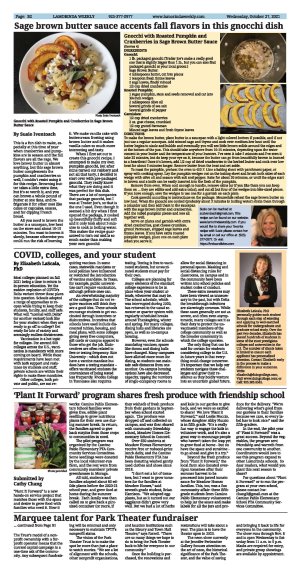| | Published October 27th, 2021
| COVID, colleges, and your student
| | | By Elizabeth LaScala |  | | Elizabeth LaScala, PhD personally guides each student through each step of selecting and applying to well-matched schools for undergraduate and graduate school study. Over the past two decades, Elizabeth has placed hundreds of students in some of the most prestigious colleges and universities in the U.S. The number of clients taken is limited to ensure each applicant has personalized attention. Contact Elizabeth early in the process to make a difference in your outcomes. Write elizabeth@doingcollege.com; Visit www.doingcollege.com; or Call: 925.385.0562. |
Most colleges planned on fall 2021 being a time to return to in-person education. Yet the sudden explosion of COVID's Delta variant threw these plans into question. Schools adopted a range of approaches to reopen while trying to keep their students, faculty, and staff safe. What will "normal with Delta" (or another variant) look like for your student when they are ready to go off to college? Get ready for lots of variety and seemingly endless divisiveness.
 Vaccination is a hot topic for colleges. For around 600 colleges across the U.S., vaccination is mandatory with more coming on board. While these requirements have been met with both support and resistance by students and staff, private schools are within their rights to make these mandates.
Vaccination is a hot topic for colleges. For around 600 colleges across the U.S., vaccination is mandatory with more coming on board. While these requirements have been met with both support and resistance by students and staff, private schools are within their rights to make these mandates.
 Other colleges, both private and public, are not requiring vaccines. In some cases, statewide mandates or local policies have influenced or restricted the introduction of vaccine mandates. In Texas, for example, public universities can't require vaccination, although private ones can.
Other colleges, both private and public, are not requiring vaccines. In some cases, statewide mandates or local policies have influenced or restricted the introduction of vaccine mandates. In Texas, for example, public universities can't require vaccination, although private ones can.
 An overwhelming majority of the colleges that do not require vaccines still think they are a good idea. These schools encourage students to get vaccinated through incentives or disincentives. Incentives that schools have used include discounted tuition, housing, and meal plans, with some colleges giving away free computers, gift cards or campus apparel to those who get the jab. Disincentives are often related to fees or testing frequency. Rice University - which does not have a vaccine mandate but does have a testing mandate - offers vaccinated students the convenience of being tested less frequently. Rhodes College in Tennessee also requires testing. Testing is free to vaccinated students, but unvaccinated students must pay for their own.
An overwhelming majority of the colleges that do not require vaccines still think they are a good idea. These schools encourage students to get vaccinated through incentives or disincentives. Incentives that schools have used include discounted tuition, housing, and meal plans, with some colleges giving away free computers, gift cards or campus apparel to those who get the jab. Disincentives are often related to fees or testing frequency. Rice University - which does not have a vaccine mandate but does have a testing mandate - offers vaccinated students the convenience of being tested less frequently. Rhodes College in Tennessee also requires testing. Testing is free to vaccinated students, but unvaccinated students must pay for their own.
 Colleges are planning for many elements of the standard college experience to be in place when your student attends, whenever that may be. The school schedule, which was interrupted during 2020, has returned to the usual semester or quarter system with regularly scheduled breaks around Thanksgiving, winter and spring. For many colleges, dining halls and libraries are open, as well as on-campus housing.
Colleges are planning for many elements of the standard college experience to be in place when your student attends, whenever that may be. The school schedule, which was interrupted during 2020, has returned to the usual semester or quarter system with regularly scheduled breaks around Thanksgiving, winter and spring. For many colleges, dining halls and libraries are open, as well as on-campus housing.
 However, even for schools mandating vaccines, spaces like dorms and dining halls have changed. Many campuses have allotted more room for dining, so students can maintain safe distances from one another. On-campus housing options have also decreased capacity, upping the numbers of single-occupancy rooms to allow for social distancing in personal spaces. Masking and social distancing rules for classrooms, on campus and in the community have been written into school policies and student codes of conduct.
However, even for schools mandating vaccines, spaces like dorms and dining halls have changed. Many campuses have allotted more room for dining, so students can maintain safe distances from one another. On-campus housing options have also decreased capacity, upping the numbers of single-occupancy rooms to allow for social distancing in personal spaces. Masking and social distancing rules for classrooms, on campus and in the community have been written into school policies and student codes of conduct.
 These extra measures may have been viewed as unnecessary in the past, but with Delta the breakthrough infections are alarmingly common. While these cases generally are not as severe, and often even asymptomatic, many colleges see it as their duty to protect the unvaccinated members of the college community as well as the broader community in which the college operates.
These extra measures may have been viewed as unnecessary in the past, but with Delta the breakthrough infections are alarmingly common. While these cases generally are not as severe, and often even asymptomatic, many colleges see it as their duty to protect the unvaccinated members of the college community as well as the broader community in which the college operates.
 The only thing that can be said for certain for students considering college in the U.S. in future years is that everything could change tomorrow. It's important that we help our students navigate these challenges and grow their resilience as they boldly venture into an uncertain global future.
The only thing that can be said for certain for students considering college in the U.S. in future years is that everything could change tomorrow. It's important that we help our students navigate these challenges and grow their resilience as they boldly venture into an uncertain global future. |
| | | | | | | | | | | | |



